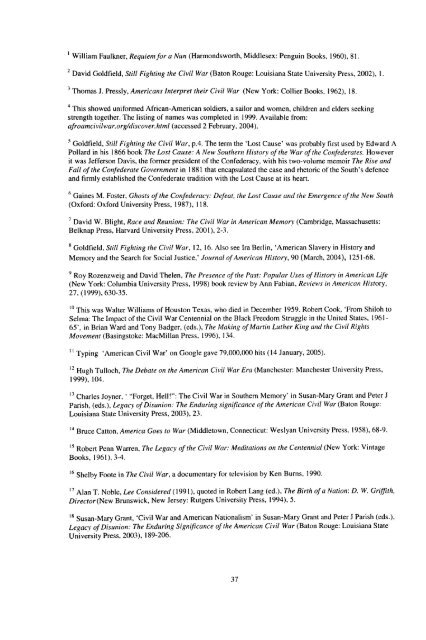Download (3483kB) - Greenwich Academic Literature Archive ...
Download (3483kB) - Greenwich Academic Literature Archive ...
Download (3483kB) - Greenwich Academic Literature Archive ...
- No tags were found...
Create successful ePaper yourself
Turn your PDF publications into a flip-book with our unique Google optimized e-Paper software.
1 William Faulkner, Requiem for a Nun (Harmondsworth, Middlesex: Penguin Books, 1960), 81.2 David Goldfield, Still Fighting the Civil War (Baton Rouge: Louisiana State University Press, 2002), 1.3 Thomas J. Pressly, Americans Interpret their Civil War (New York: Collier Books, 1962), 18.4 This showed uniformed African-American soldiers, a sailor and women, children and elders seekingstrength together. The listing of names was completed in 1999. Available from:afroamcivilwar.org/discover.html (accessed 2 February, 2004).5 Goldfield, Still Fighting the Civil War, p.4. The term the 'Lost Cause' was probably first used by Edward APollard in his 1866 book The Lost Cause: A New Southern History of the War of the Confederates. Howeverit was Jefferson Davis, the former president of the Confederacy, with his two-volume memoir The Rise andFall of the Confederate Government in 1881 that encapsulated the case and rhetoric of the South's defenceand firmly established the Confederate tradition with the Lost Cause at its heart.Gaines M. Foster, Ghosts of the Confederacy: Defeat, the Lost Cause and the Emergence of the New South(Oxford: Oxford University Press, 1987), 118.7 David W. Blight, Race and Reunion: The Civil War in American Memory (Cambridge, Massachusetts:Belknap Press, Harvard University Press, 2001), 2-3.8 Goldfield, Sf/7/ Fighting the Civil War, 12, 16. Also see Ira Berlin, 'American Slavery in History andMemory and the Search for Social Justice,' Journal of American History, 90 (March, 2004), 1251-68.Roy Rozenzweig and David Thelen, The Presence of the Past: Popular Uses of History in American Life(New York: Columbia University Press, 1998) book review by Ann Fabian, Reviews in American History,27, (1999), 630-35.10 This was Walter Williams of Houston Texas, who died in December 1959. Robert Cook, 'From Shiloh toSelma: The Impact of the Civil War Centennial on the Black Freedom Struggle in the United States, 1961-65', in Brian Ward and Tony Badger, (eds.), The Making of Martin Luther King and the Civil RightsMovement (Basingstoke: MacMillan Press, 1996), 134.11 Typing 'American Civil War' on Google gave 79,000,000 hits (14 January, 2005).12 Hugh Tulloch, The Debate on the American Civil War Era (Manchester: Manchester University Press,1999), 104.n Charles Joyner, ' "Forget, Hell!": The Civil War in Southern Memory' in Susan-Mary Grant and Peter JParish, (eds.), Legacy of Disunion: The Enduring significance of the American Civil War (Baton Rouge:Louisiana State University Press, 2003), 23.14Bruce Catton, America Goes to War (Middletown, Connecticut: Weslyan University Press, 1958), 68-9.15 Robert Penn Warren, The Legacy of the Civil War: Meditations on the Centennial (New York: VintageBooks, 1961), 3-4.16 Shelby Foote in The Civil War, a documentary for television by Ken Burns, 1990.17 Alan T. Noble, Lee Considered (1991), quoted in Robert Lang (ed.), The Birth of a Nation: D. W. Griffith,Director (New Brunswick, New Jersey: Rutgers University Press, 1994), 5.18 Susan-Mary Grant, 'Civil War and American Nationalism' in Susan-Mary Grant and Peter J Parish (eds.),Legacy of Disunion: The Enduring Significance of the American Civil War (Baton Rouge: Louisiana StateUniversity Press, 2003), 189-206.37
















